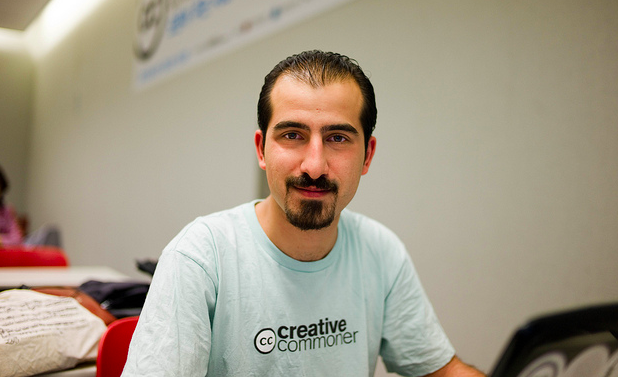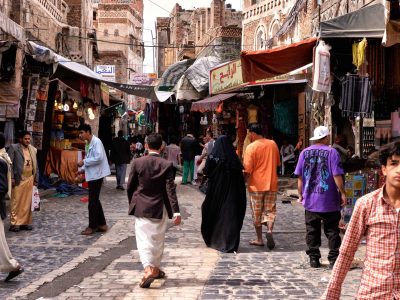One year ago today, Syrian web developer and open technology advocate Bassel Khartabil was arrested and incarcerated in Damascus, where he has remained ever since. Known among open technology advocates as Bassel Safadi, the 31-year-old served as the Creative Commons lead for Syria and worked on a variety of open source software projects including Mozilla Firefox and Fabricatorz.

Bassel Khartabil. Photo by Joi. (CC BY 2.0)
For months, Bassel's family had no information on his whereabouts. In July of 2012, they learned he was being held at a military intelligence base in the Kafr Suseh section of Damascus. Until recently, little else was known about his condition. Rumors of torture, rape, and other forms of abuse at the base left his family terrified of his fate.
When news of Bassel's imprisonment became public, supporters at Creative Commons launched the #freebassel campaign and website, which has become a critical space for advocacy and information-sharing about Bassel's status. Human Rights Watch, Amnesty International, Global Voices, and other Internet and human rights organizations around the world also have worked to raise awareness of his case and advocate for his release.
In November, Foreign Policy Magazine named Bassel one of the world's 100 top global thinkers, drawing a wave of international media attention to his case. Shortly thereafer, Bassel was moved to a civilian prison in the suburbs of Damascus.
Oussama Al Rifai, Bassel's uncle, told The Toronto Star that he believes the Foreign Policy feature was critical in helping to keep Bassel alive and facilitate his transfer. “He was tortured everyday, but then after Foreign Policy’s ranking everything stopped.”
Since this time, he has had visitation rights and has been able to see his family. Family members say that both his mental and physical health are deteriorating as a result of his incarceration.
Bassel's work has had a powerful influence on open technology communities in the MENA region. @MoNajem, a friend of Bassel's from Beirut, told Global Voices Advocacy, “the Arab community is missing Bassel's activities. We are inspired every day by his beliefs and work toward an open Internet.”
As Syria's country lead for Creative Commons, Bassel also developed many strong relationships with innovators and advocates in other parts of the world. Former Creative Commons board chair and MIT Media Lab director Joi Ito, who worked closely with Bassel before his arrest, commented on Bassel's role as an “ambassador” of culture:
Bassel is a dear friend. He has been a tremendously important contributor to Mozilla and Creative Commons. His work to increase access to knowledge and technology in his country is a testament to his love for Syria. He was also a great promoter of Syrian culture. He introduced me to the arts and artists of Syria — this is how I fell in love with Syria.
Donatella della Ratta, Creative Commons regional coordinator for the Arab world, told GVA:
[Bassel] is highly missed in our communities, though not only because of his valuable contribution to openness and sharing. He is a generous person who knows what community work and collaboration mean. I personally miss him as a dear friend and somebody who has always been there to solve problems and help others.
Comments from many other friends and colleagues have also spoken to Bassel's unflinching commitment to sharing knowledge and culture and to developing technologies that enable this kind of exchange. Index on Censorship recently announced that Bassel has been shortlisted for the organization's Digital Freedom Awards, which will be presented next week.
In a recent op-ed for The Wall Street Journal, Creative Commons co-founder and open Internet luminary Lawrence Lessig described the “threat” that Bassel poses for the Syrian government:
Mr. Khartabil isn't a partisan, aligned with one Syrian faction against another. He represents a future, aligned against a totalitarian past….The government wants to shut the free-software, free-culture movement down, in a way that only a totalitarian regime can. Syria won't win this battle in the long term….It, too, will learn that the future cannot be stopped, even if the men and women leading it can be silenced.
Global Voices Advocacy urges readers to support the #freebassel campaign by visiting the website, tweeting about Bassel's case (#freebassel), or attending an event in his honor.
Nasser Wedaddy contributed research and reporting for this post.
Recent Global Voices coverage of Bassel Khartabil's case:
#FastforBassel: Campaign Launched for Syrian Netizen Facing Military Trial
#FreeBassel: Netizen Under Serious Threat
Global Voices’ special coverage of protests in Syria




8 comments
Free Bassel, Free Culture